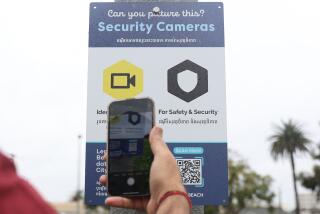Corporate Monitoring Is a Growing Privacy Woe
- Share via
Little Brother is watching you.
A car rental company in Connecticut was ordered recently to stop penalizing customers driving cars equipped with a Global Positioning System that keeps track of how many times the vehicle exceeds posted speed limits.
The state’s consumer protection department told Acme Rent-a-Car to return all the money taken from its customers as a result of the practice--not because it was incredibly invasive but because under state law, Acme had no grounds to fine customers because the company had suffered no damage.
This extremely narrow decision doesn’t bode well for life in America, where, in an effort to make life easier, lives are all too often made transparent.
George Orwell in “1984” described the family television as a tool that also let authorities--Big Brother--see and hear whatever was happening in the room. Such monitoring devices were scattered throughout society, and everybody knew about them: “You had to live--did live, from habit that became instinct--in the assumption that every sound you made was overheard, and except in darkness, every movement scrutinized.” Fortunately, Orwell didn’t conceive of infrared sensors, night-vision devices and GPS, or he might have become too terrified to sleep.
Orwell’s fear was government monitoring, but the real danger today is corporate monitoring: companies using technology to keep track of everything about you. This Little Brother knows more about you than Orwell’s Big Brother ever knew about Winston Smith.
So-called loyalty or rewards cards--those annoying pieces of plastic you have to use to get a fair price at the local market--are a prime example. Even the venerable credit card leaves your life an open book for snoops, as Monica Lewinsky discovered when prosecutors scrutinized book purchases she’d made using plastic.
A system in California known as FasTrak lets you put a little doodad on your windshield and automatically pay a toll without having to stop at the booth. The money is automatically deducted from your account. But the monthly statements list not only the time and day you passed through the gate but also the freeway and direction traveled as well.
The issue here is not that such information might be misused. (Although, for a guy who’s profoundly distrustful of such systems, the question is not whether somebody will illegally use the information in such databases, but when and to what extent.) The real issue is how this affects the way people behave.
If people know that everything they do is being tracked, will that influence behavior?
The typical response is, “Hey, if you’re not doing anything wrong, what are you worried about?” Most people think it’s worth losing a little privacy in return for something else--whether a safer neighborhood, a cheaper bottle of soda or a quicker trip down the road. This is what political scientists refer to as the lure of totalitarianism, the promise of a better life in return for the surrender of personal privacy. The idea, taken to the extreme, is that putting cameras in bedrooms ends spousal abuse.
A noble sentiment, but what’s the price to be paid for that loss of privacy? Yes, people will think twice before breaking the law. But they’ll also think twice before doing anything embarrassing, unusual, eccentric or experimental. Who’s going to be bold and daring if somebody else might see them fall down?
The Supreme Court has used this sort of logic to protect the right of free speech, ruling that prohibiting certain unwelcome behavior--such as adult conversations in public areas of the Internet, where young people might see them--would have a chilling effect on free speech. The efforts went too far to protect children from adult conversations by requiring all adult conversations to take place at a level acceptable for children.
Yet it seems inevitable that the same issues will soon arise again, not in terms of speech, but in terms of behavior, as our technology becomes more and more capable of tracking who’s doing what, where and when.
At the moment, the best way to prevent private companies from sucking up information about your life is to just say no.
Little Brother’s wares often are not worth their price in privacy. The problem is, much of your information already has been collected.
Left unchecked, Little Brother’s information grab creates a bland, cautious world where the only true freedom exists inside one’s own head.
Give Little Brother what he wants and Orwell’s words will appear startlingly prescient: “If you want to imagine the future, imagine a boot stamping on a human face forever.”
*
Dave Wilson is The Times’ personal technology columnist.






